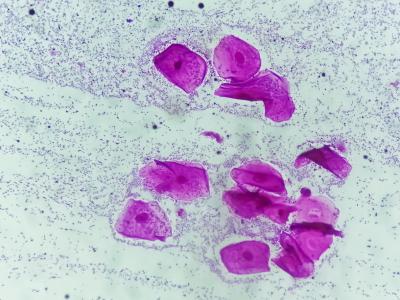Francis Collins given official nod to continue as NIH director
President Donald Trump announced yesterday that Francis Collins, MD, PhD, an Obama administration holdover, will stay on as permanent director of the National Institutes of Health (NIH), multiple media sites reported.
Collins, a physician and geneticist appointed in 2009, was asked to stay on temporarily after Trump's November 2016 election. Yesterday's move made it official. Before joining the NIH, he was well known for spearheading the International Human Genome Project, which in 2003 sequenced the entire human genome for the first time.
The NIH, which employs about 20,000 people, is a division of the Department of Health and Human Services. It comprises 27 institutes and centers and awards billions of dollars in research grants each year. Collins retains NIH leadership at a time when Trump has asked for a 22% cut in the agency's $32 billion budget. Collins has avoided explaining how the NIH would survive such a dramatic cut, pointing instead to the agency's broad bipartisan congressional support, ScienceInsider reported.
In a statement, Collins said, "I am honored to continue as the Director of the National Institutes of Health and consider it a great privilege to serve at a time of unprecedented opportunity to advance health and relieve suffering through biomedical research. . . . I am grateful for the President's vote of confidence in my ability to continue to lead this great agency."
Sen Lamar Alexander (R-Tenn.), who chairs the Senate health committee, called the announcement "good news for the country and one of President Trump's best appointments. There's nobody better qualified than Francis Collins to help accelerate the medical miracles that have the potential to help virtually every American family."
Jun 6 ScienceInsider story
NIH bio on Collins
Zika DNA vaccine protects reproductive tract in male mice
A new DNA-based Zika vaccine protected mice from Zika-related damage to the testes in a new clinical trial. Inovio Pharmaceuticals, the makers of the vaccine (GLS-5700), published the results of the trial today in Nature Communications.
In a press statement, Inovio said the results of the trial could mean that GLS-5700 could one day prevent sexual transmission of the mosquito-borne disease.
In the study, 10-week-old mice were challenged with high doses of Zika virus after receiving one dose of GLS-5700. Controls showed high levels of Zika RNA in sperm samples, but the vaccinated mice exhibited no signs of the Zika virus in their testes.
In other Zika news, whole-blood samples contain Zika virus antigens that can be useful in detecting the illness in people via flow cytometry, according to a study in the Journal of Infectious Diseases based on whole-blood samples taken from Zika patients during Singapore's 2015-2016 outbreak.
Although using polymerase chain reaction to detect Zika virus is common practice, the authors of the study note that people with mild illness might not get tested, and results could be skewed if the patient has waited too long.
"The use of whole blood staining for Zika antigen in blood monocytes is a cost-effective method with a short turnaround time that should be explored in the future as an alternative to aid in the diagnosis of active ZIKAV infection," the authors conclude.
Jun 7 Nat Communstudy
Jun 7 Inovio press release
Jun 6 J Infect Dis study
New Mexico confirms first case of human plague this year
Earlier this week the New Mexico Department of Health (NMDOH) confirmed the state's first human case of plague of the year, in a 63-year-old man. He is hospitalized in Sante Fe County.
An environmental investigation is under way in the man's home, and neighbors have been informed of the risk. Plague is a serious bacterial infection typically transmitted from rodents to humans via flea bites.
So far this year, 10 dogs and 5 cats have contracted the disease in New Mexico.
"Plague activity has been widespread in northcentral New Mexico this spring," said Paul Ettestad, DVM, public health veterinarian for the NMDOH. "Sick or dead rodents and rabbits are being reported from different areas in the state, so it is very important to take precautions to avoid rodents and their fleas which can expose you to plague. Pets that are allowed to roam and hunt can bring plague-infected fleas from dead rodents back into the home, putting you and your children at risk."
Symptoms of plague begin with a sudden onset of fever, chills, and swelling in the lymph nodes that line the groin, armpits, and neck. Antibiotics can prevent death and serious complications when administered quickly after diagnosis.
Jun 5 NMDOH statement
FDA recommends post-exposure step to prevent hepatitis A in tuna case
The US Food and Drug Administration (FDA) is recommending post-exposure hepatitis A prophylaxis for any unvaccinated people who may have eaten recalled fish or undercooked tuna products in the past 2 weeks.
As of May 18, Hilo Fish Company recalled frozen tuna that may be contaminated by the hepatitis A virus. There are no illnesses linked to the tuna as yet, but the fish in question was distributed to restaurants and retailers in New York, Texas, Oklahoma, and California. The FDA has published the names of these restaurants and retailers on its Web site.
Post-exposure prophylaxis includes a hepatitis A vaccine for people between the ages of 1 and 40, and hepatitis A virus-specific immunoglobulin (IG) for people outside of that age range. The FDA said that people who are unsure of their vaccination status should speak with their doctors.
Hepatitis A is a serious liver infection that can be transmitted through contaminated food and water.
Jun 6 FDA statement













